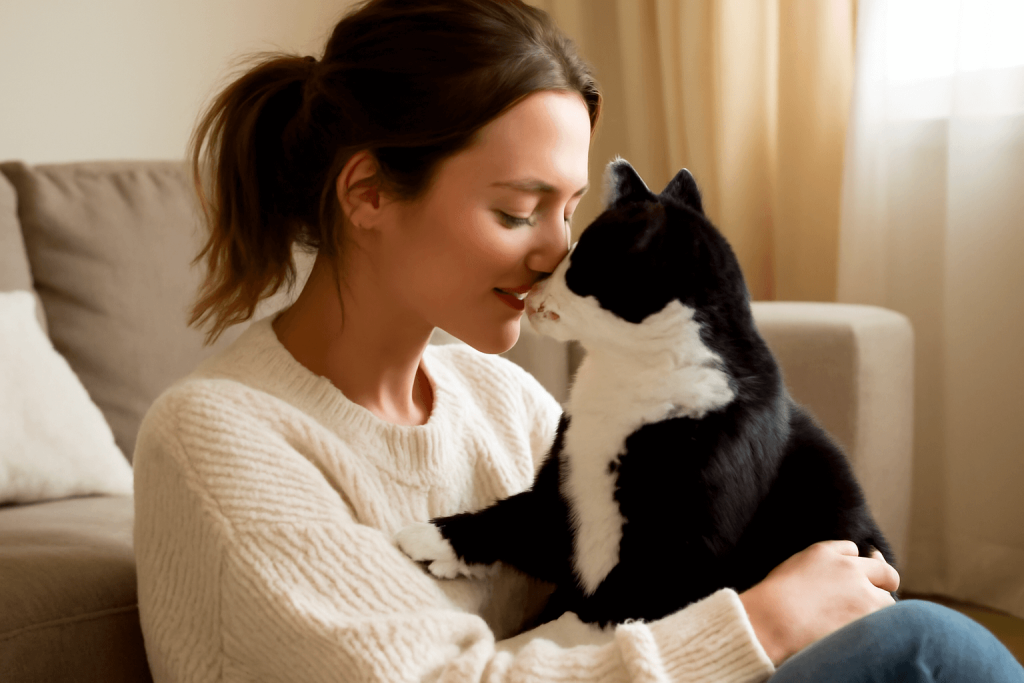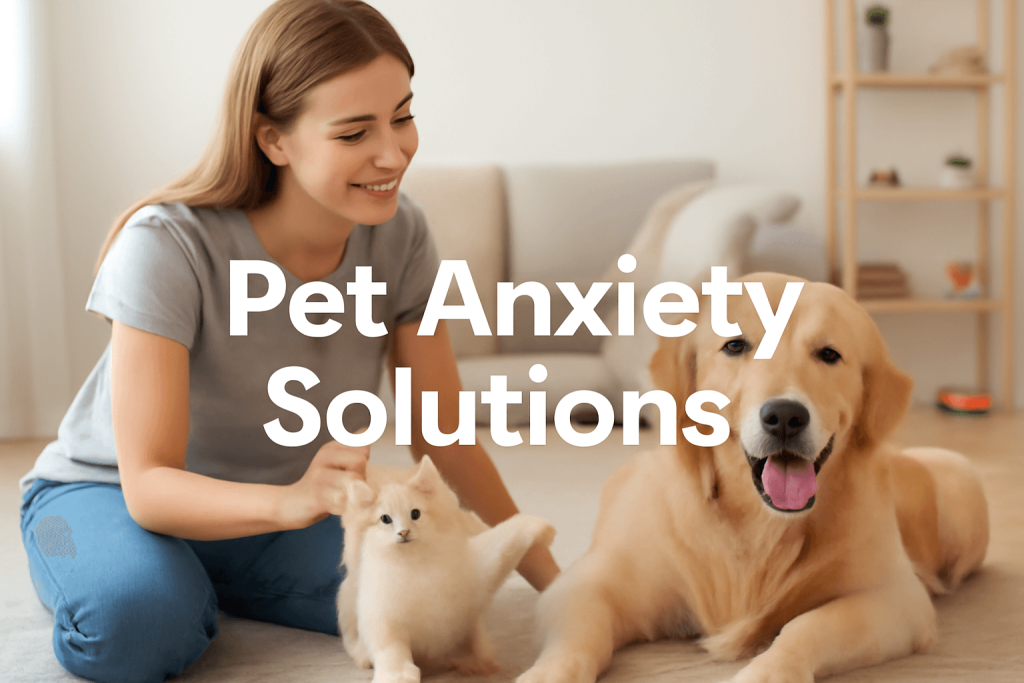Physical Address
304 North Cardinal St.
Dorchester Center, MA 02124
Physical Address
304 North Cardinal St.
Dorchester Center, MA 02124
The Best Pet Destinations
The Best Pet Destinations

Pet anxiety is a common issue that affects many pets, causing them distress and discomfort. Whether it’s separation anxiety, fear of loud noises, or travel-related stress, dealing with pet anxiety can be challenging for both pets and their owners. In this pet anxiety solutions guide, we’ll explore the different types of anxiety pets experience and provide practical tips and solutions to help calm your furry friend.
Understanding pet anxiety is the first step toward finding effective solutions. Identifying the signs and causes of anxiety will allow you to implement the right strategies and tools to help your pet feel more secure. From calming products to natural remedies and professional training, there are numerous ways to address pet anxiety and improve your pet’s quality of life.
This article will help you navigate through the different pet anxiety solutions, offering expert advice and actionable steps to reduce your pet’s stress and create a calmer environment for both you and your furry companion.
Before addressing pet anxiety solutions, it’s important to recognize the signs that your pet may be experiencing anxiety. Pets are often unable to communicate their feelings in the same way humans do, but there are several behavioral and physical signs that can indicate they are stressed or anxious.
Recognizing these behavioral signs early on is crucial in identifying the need for pet anxiety solutions.
By recognizing these signs, you can take action to help alleviate your pet’s anxiety and begin exploring the right pet anxiety solutions to address their needs.
Understanding the root causes of your pet’s anxiety is essential to choosing the best pet anxiety solutions. There are several triggers that may cause anxiety in pets, ranging from environmental factors to changes in routine. By identifying the specific cause of your pet’s anxiety, you can effectively address it with the right strategies.
One of the most common causes of anxiety in pets, particularly dogs, is separation anxiety. This occurs when pets become distressed when left alone or when they are separated from their owner. Pets with separation anxiety may display behaviors such as:
To address separation anxiety, pet anxiety solutions might include gradual desensitization, crate training, or the use of calming products to reduce stress when left alone.
Loud noises, such as thunderstorms, fireworks, or even vacuum cleaners, can trigger anxiety in pets. Noise anxiety is common in both dogs and cats and may lead to behaviors like:
For pet anxiety solutions, calming products like pheromone diffusers, as well as creating a safe space for your pet during loud events, can help alleviate this type of anxiety.
Many pets experience anxiety when traveling, whether by car, train, or plane. Travel-related anxiety can be caused by several factors, including unfamiliar environments, motion sickness, or confinement in a carrier. Symptoms may include:
To minimize travel anxiety, pet anxiety solutions like familiarizing your pet with their carrier, providing comfort items, and using calming products can make travel more manageable for your pet.
For more information about travel anxiety please click here!
Creating a calm and comfortable environment at home is one of the most effective pet anxiety solutions. By setting up a peaceful space and providing comforting items, you can help reduce your pet’s stress levels. In this section, we’ll discuss several strategies you can implement at home to ease your pet’s anxiety.
The environment you create for your pet can significantly impact their anxiety levels. To help calm your pet at home:
By providing a safe and secure environment, you give your pet a place to relax and feel protected, which is a key pet anxiety solution.
Comfort items can go a long way in easing your pet’s anxiety, especially if they are left alone for long periods. These items provide a sense of security and familiarity, which can help reduce stress.
These comfort items are simple yet effective pet anxiety solutions that can make a big difference in helping your pet feel at ease.
Several products on the market are designed specifically to help pets cope with anxiety. These can be particularly useful for short-term relief or for specific triggers like loud noises or travel.
Using these calming products can be an excellent addition to your pet anxiety solutions toolkit, helping your pet feel more relaxed and at ease.
In addition to traditional methods, there are several natural remedies that can help calm your pet’s anxiety. These natural solutions can be particularly beneficial for pets who are sensitive to medications or calming products. In this section, we’ll explore some of the most popular natural remedies for pet anxiety.
Many herbs have natural calming properties that can help alleviate stress and anxiety in pets. Here are some herbal solutions that can be effective:
These herbs are excellent pet anxiety solutions for pets who respond well to natural remedies, offering a gentle and non-invasive way to manage anxiety.
CBD oil has gained popularity as a natural solution for pet anxiety. It’s derived from hemp and contains no THC, making it safe for pets. Many pet owners report positive results when using CBD oil to manage their pet’s anxiety, especially in cases of separation or noise anxiety.
CBD oil is a promising pet anxiety solution for those seeking a natural approach to managing their pet’s anxiety.
Aromatherapy can be a soothing way to help calm your pet during stressful situations. Essential oils like lavender and chamomile have been shown to have calming effects, both for humans and animals.
Aromatherapy is a wonderful pet anxiety solution that promotes relaxation and creates a peaceful environment for your pet.
Training your pet to manage their anxiety is an essential part of any pet anxiety solutions plan. With patience and consistency, you can help your pet become more comfortable in situations that typically cause stress. In this section, we’ll explore effective training techniques and behavioral solutions that can help alleviate your pet’s anxiety.
Desensitization is a gradual process that helps your pet become less sensitive to the triggers that cause anxiety. This technique involves exposing your pet to the stressor in a controlled, low-intensity environment and gradually increasing the intensity over time. For example, if your dog is anxious around loud noises:
Desensitization is a gradual but effective pet anxiety solution for pets who experience anxiety from specific triggers like noise or separation.
Positive reinforcement is a training technique that rewards your pet for calm behavior, reinforcing the idea that staying relaxed results in positive outcomes. When using positive reinforcement for pet anxiety solutions:
Positive reinforcement helps your pet associate calm behavior with good outcomes, making it an effective pet anxiety solution for long-term anxiety management.
Sometimes, despite your best efforts, your pet’s anxiety may persist, and professional help may be needed. A certified pet behaviorist or trainer specializing in anxiety can provide targeted strategies to help address your pet’s specific needs.
Professional training can be an invaluable pet anxiety solution if you are struggling to manage your pet’s anxiety on your own.
In some cases, your pet’s anxiety may be severe enough that medical intervention is necessary. If your pet’s anxiety is not improving with behavioral solutions or natural remedies, a veterinarian may recommend medication. In this section, we’ll discuss medical solutions for managing pet anxiety.
There are various medications available to help manage pet anxiety. These medications are typically prescribed by a veterinarian and can be used alongside behavioral and natural treatments for maximum effectiveness. Some common medications for pet anxiety include:
It’s important to consult with your veterinarian to determine the best medication for your pet’s specific anxiety and to ensure the dosage is appropriate. Medication should be considered as part of a broader pet anxiety solution plan.
If your pet’s anxiety is severe or persistent, consulting with a veterinarian is essential. A vet will be able to:
Consulting your veterinarian ensures that you’re taking the most appropriate approach to manage your pet’s anxiety and provides you with professional support as you explore pet anxiety solutions.

Every pet is different, and anxiety can manifest in various situations. In this section, we’ll discuss pet anxiety solutions for specific scenarios that commonly trigger stress in pets. Whether it’s travel, thunderstorms, or separation, there are tailored strategies to help your pet feel more comfortable.
Many pets, especially cats and dogs, experience anxiety during travel, whether it’s a short car ride or a long road trip. To alleviate travel-related anxiety:
These pet anxiety solutions can help reduce travel-related stress and make the journey more enjoyable for both you and your pet.
Loud noises like thunderstorms and fireworks are common triggers of anxiety in pets, especially dogs. To manage anxiety during these events:
By preparing in advance and using these pet anxiety solutions, you can help your pet feel more secure during thunderstorms and fireworks.
Separation anxiety is a common issue for pets, especially when their owners leave them alone. To address separation anxiety:
Addressing separation anxiety early on with these pet anxiety solutions will help your pet feel more comfortable when left alone.
Managing pet anxiety is essential for your pet’s well-being and your peace of mind. By understanding the causes of anxiety and implementing pet anxiety solutions like natural remedies, calming products, and professional training, you can help your pet feel more secure in various situations. Whether it’s travel anxiety, separation stress, or noise-related fears, the right approach will make a significant difference in your pet’s comfort.
Remember, every pet is unique, and it may take time to find the right combination of pet anxiety solutions that work for your furry friend. With patience and persistence, you can help your pet overcome anxiety and create a happier, more relaxed environment for both of you.
Common signs of pet anxiety include excessive barking, drooling, trembling, and destructive behavior.
Natural remedies include calming herbs like chamomile, valerian root, and the use of CBD oil for pets.
Gradually desensitize your pet to being alone and provide comfort items like a blanket or your clothing.
Yes, calming collars that release pheromones can help reduce anxiety, especially during stressful events.
Use calming products, make sure your pet is securely fastened, and take regular breaks during long trips.
Yes, a vet can help assess your pet’s anxiety and recommend appropriate treatment, including medication or behavior modification.
Create a safe space, use calming products like pheromone diffusers, and provide comfort with blankets and familiar items.